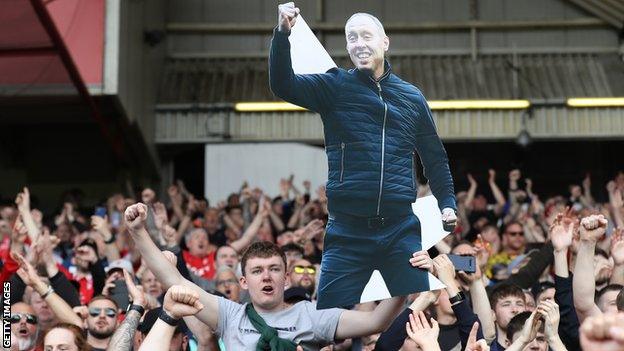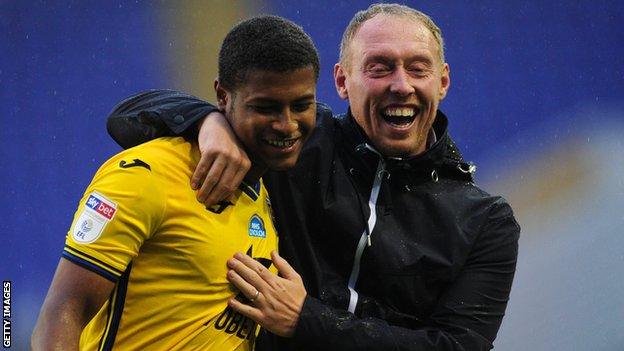Steve Cooper: Nottingham Forest boss has transformed the club
- Published

Nottingham Forest are in the Championship play-off final despite making their worst start to a season since 1913 before Steve Cooper took charge, having lost six of their opening seven games.
Nottingham Forest are not supposed to be in the Championship play-off final, not this season.
A club who have gone through 14 bosses in 10 years, a club who were rock bottom of the Championship when Chris Hughton was sacked in September, a club who have become the ultimate example of a "sleeping giant" in English football.
Two times the champions of Europe, Nottingham Forest have not featured in the Premier League in the 21st century, but are now 90 minutes from ending a 23-year absence.
Forest's rise after their worst start to a season in over a century owes an awful lot to an unassuming Welshman who might just be about to make fans' dreams a reality after years of nightmares.
His name is Steve Cooper and he is the man who utterly transformed Nottingham Forest.
A World Cup winner
Cooper's route to possible Premier League manager has not been conventional - he won a World Cup as a manager before he had presided over a single club game.
The son of former Premier League referee Keith Cooper, Steve Cooper the footballer had a nearly, but not quite, career; failing to make the grade at Wrexham before playing for The New Saints, Rhyl, Bangor City and Porthmadog.
Throughout his time in the Welsh Premier League, Cooper was eyeing a future as a coach.
Cooper was only 27 years old when he earned his Uefa Pro licence and after progressing to become Wrexham's head of youth, he joined Liverpool's academy and worked with the likes of Raheem Sterling and Trent Alexander-Arnold.

Manchester City's Phil Foden scored twice as England beat Spain to win the 2017 Under-17 World Cup
Cooper had become Liverpool's academy manager before he joined the Football Association in 2013, where he was later named under-17s coach in 2015.
In 2017 Cooper won the under-17s World Cup, with a team including Jadon Sancho and Phil Foden, as England beat Spain 5-2 in the final.
England played with such intensity and fluidity it was only a matter of time until a club came calling, as his former colleague at the FA and now Wales women's national team boss Gemma Grainger recalls.
"Steve and I worked together at the English FA, I was under-17s women coach and he was men's coach and his qualities as a leader always shone," she said.
"He was always very open about sharing his processes and his planning, he's meticulous.
"He's an incredible leader, the way he helps players, he inspires his staff and he has real strengths."
With a World Cup won and players raving about him, a transition to club football was inevitable.
It just came down to who would roll the dice on someone with no experience of managing at a senior level.

Rhian Brewster scored 11 goals in 21 appearances for Swansea, but has only found the net four times in the past two seasons for Sheffield United
The road to Nottingham... via Swansea
Swansea City felt like a natural fit for Cooper.
A club with a track record of strong managerial appointments, the Swans - in transition and in the Championship - were happy to take the chance on Cooper after losing Graham Potter to Premier League Brighton.
However, despite still receiving Premier League parachute payments, Swansea nonetheless felt a determination to slash their wage bill, with key performers such as Daniel James and Oli McBurnie sold and not replaced.
Yet despite being set for a period of transition - Swansea finished 15th last season - despite shedding key stars, Swansea became promotion contenders.
Cooper, as he tends to do, found a problem he was able to solve, as he utilised his relationships working in the FA with the best of English football's young talent.
The Swans reached the play-offs in 2020 thanks to some superb loan signings as the likes of Freddie Woodman, Rhian Brewster, Marc Guehi and Conor Gallagher made key contributions, but Swansea were beaten by Brentford in the semi-finals.
Despite spending just £1m towards the 2020-21 campaign, with Joe Rodon sold to Spurs for 10 times that amount, Cooper once again led Swansea to the play-offs with key performers including Andre Ayew and Connor Roberts taking the club all the way to Wembley.
Yet the Swansea fans were restless. They did not enjoy the style of football Cooper was deploying as he placed results over the notion of playing "the Swansea way".
After a 2-0 play-off final defeat to Brentford, there seemed little desire from coach or club for the relationship to continue.
"I think he did a fantastic job, Swansea probably missed a bit of a trick there," former Wales striker Nathan Blake said.
"I think after reaching the play-offs twice, promotion in the third season seemed a natural progression. If I was a Swansea board member or fan, I'd be kicking myself.
"It's difficult to know why he's not more loved by Swansea fans. With the budget he had and the players he had, he was a master at being able to get results.
"Will Swansea fans be happier next season if they finish outside the top 10 and Forest are in the Premier League?"
Cooper left by mutual consent in July, but from the heights of the play-off final he was soon signing up for a relegation battle... or so it seemed.
Highlights: Ruthless Forest knock holders Leicester out of FA Cup
A relegation battle becomes a promotion push
Despite punching well above his weight with Swansea, Cooper's next job was at the City Ground, where Forest were rock bottom of the Championship, a club on its knees.
The side he inherited from Chris Hughton had lost six of their first seven games in making their worst start since 1913, with Cooper becoming the 14th manager they had appointed in a decade since Billy Davies' departure in 2011.
Not only has Cooper transformed Forest's fortunes, taking more points than any other side since his appointment in September, but he did so in style. He turned a relegation battle into an incredible campaign where automatic promotion was possible until the final week of the season.
"No-one would have given Forest a chance of being where they are after they were bottom after seven games of the season, and the players were looking a sad group," former Forest midfielder Steve Hodge told BBC Radio Nottingham.
"The whole season looked to be a write-off before he took over."
With an emphasis on attacking football, Forest powered up the table, while some of Cooper's critics at Swansea might also have been answered with emphatic 4-1 and 5-1 wins over his former side.
It was on the coaching field that the best work was done. Cooper turned water into wine. Or rather, Djed Spence from a Middlesbrough reserve to a player now eyed by several Premier League clubs, with others such as 19-goal Wales forward Brennan Johnson also given the opportunity to shine.
An eye-catching FA Cup run also boosted Cooper's profile, with Liverpool boss Jurgen Klopp singling Cooper out for praise in his speech at the League Managers' Association awards after his side edged past Forest 1-0 in the quarter-final.
"The evidence of what a good motivator and coach Steve is has been there for all to see with what he's achieved this season," Grainger added.
"His CV is definitely looking good at the moment."

Nottingham Forest have appointed 19 different managers since Ron Atkinson left the club following their relegation from the Premier League in 1999
The final hurdle
The next step for a coach who has now been to the Championship play-offs in three successive seasons is clear - to manage in the Premier League, with Forest now as close as they have been to a Premier League return.
Beaten at Wembley last season - in a match where Swansea were clearly second best - Cooper now has a chance to complete Forest's incredible revival on Sunday against Huddersfield, having survived a scare to see off Sheffield United in a tense semi-final.
"The job Steve Cooper has done at Forest is amazing," Blake added. "It is clear for everyone to see how much he's gone in and changed things."
Can Cooper now go one better at Wembley after last season's disappointment?
"He's been to the play-offs before, he's got plenty of experience and he knows exactly how to prepare to get a result in a big, one-off game," Grainger said.
If Cooper can get it done, he will have capped one of the most remarkable seasons in Forest's history, taking them from a recent nadir back to the Premier League.
But whatever the result at Wembley, after years of despair, Cooper has given Forest fans hope again.